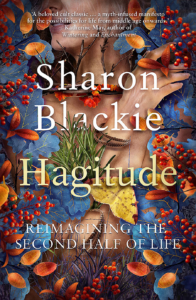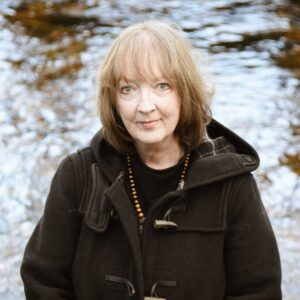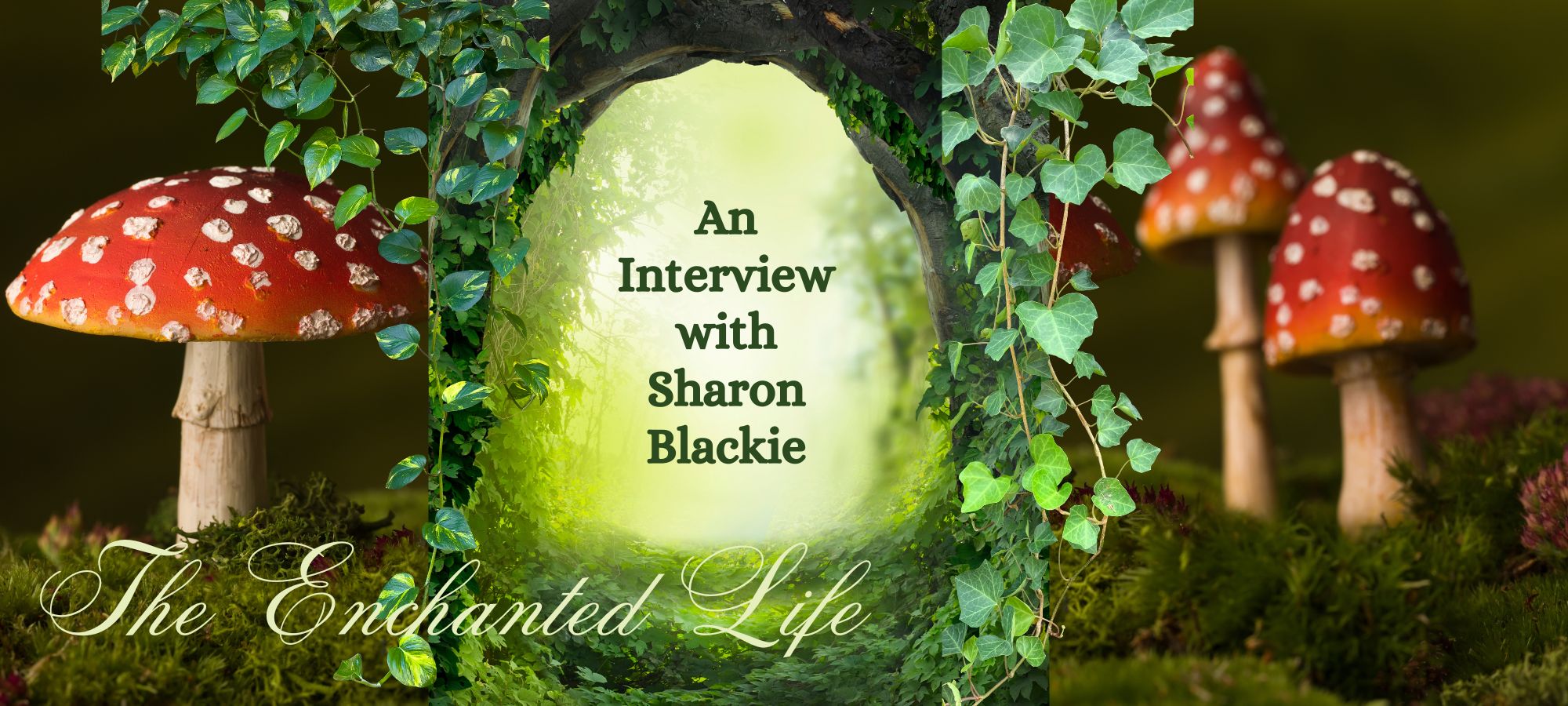Sharon Blackie is a psychologist, mythologist, and author of the best-selling If Women Rose Rooted, among her many other publications. The Sunday Times says of her, “She knows her archetypes, knows her Jung, knows her fairytales, and knows her neuroscience, and is sick of being patronised by men who don’t.” She is also teaching Pacifica Extension and International Studies’ “Graduate Certificate: Finding Ourselves in Fairytales: A Narrative Psychological Approach” May 18th – December 7th, 2024. I’m delighted to hear from Sharon about her work and perspective.
Angela Borda: I’ll try not to fangirl here, but you are the author of Hagitude, a book that I was gifted for my fiftieth birthday and adore. Your Substack publication, “The Art of Enchantment” is one of Substack’s top ten literary pages, and “a gathering place for hags, lovers of myth, fairy tales and depth psychology, exploring the mysteries of the psyche and the enchanted life.” What have you found in offering community to women who are in the second half of life? Is the process of self-inquiry, discovery, and expression different than it is in the first half of life?
 Sharon Blackie: Hagitude is very much based on Jung’s perspective that the first half is outward-focused – we’re finding our place in the collective, the outer world; we’re building family, relationships, a career and so on – but the second half of life is an inner journey, when the process of individuation becomes both more urgent and more possible. We’re looking, in essence, for meaning. This switch from outer to inner can be identified very easily in women, because although there might be stirrings in midlife, it’s strongly associated with the physical cataclysm that is menopause. You can’t really miss it! So when women come together – and Substack is a brilliant community space for this – their sharing leads to the discovery that the profound transformations they’re experiencing are actually normal, and that changes everything. Then it becomes possible to focus on the second half of life not as the end of everything that could conceivably matter to you, but as the beginning of a new story. And that story is one of growth, authenticity, meaning. Of just not taking all the nonsense any more; of learning finally to be able to say no. Of stepping into an authentic self that is no longer defined predominantly by its relationships, but by who it is, and what unique gifts it has to offer the world.
Sharon Blackie: Hagitude is very much based on Jung’s perspective that the first half is outward-focused – we’re finding our place in the collective, the outer world; we’re building family, relationships, a career and so on – but the second half of life is an inner journey, when the process of individuation becomes both more urgent and more possible. We’re looking, in essence, for meaning. This switch from outer to inner can be identified very easily in women, because although there might be stirrings in midlife, it’s strongly associated with the physical cataclysm that is menopause. You can’t really miss it! So when women come together – and Substack is a brilliant community space for this – their sharing leads to the discovery that the profound transformations they’re experiencing are actually normal, and that changes everything. Then it becomes possible to focus on the second half of life not as the end of everything that could conceivably matter to you, but as the beginning of a new story. And that story is one of growth, authenticity, meaning. Of just not taking all the nonsense any more; of learning finally to be able to say no. Of stepping into an authentic self that is no longer defined predominantly by its relationships, but by who it is, and what unique gifts it has to offer the world.
Angela: You’ve written many books, but one is about the enchanted life (The Enchanted Life: Reclaiming the Magic and Wisdom of the Natural World). There is a fair amount of content online about enchanting or romanticizing one’s life, in the vein of magical thinking, much of which involves drinking your coffee from a “cottage core” mug and intentionally creating a mood or a look in one’s daily tasks. But you say that “…Enchantment, by my definition, has nothing to do with fantasy, or escapism, or magical thinking: it is founded on a vivid sense of belongingness to a rich and many-layered world; a profound and whole-hearted participation in the adventure of life.” How is it that we as a society have grown so distant from feeling that we belong to this world, and what is the first step in entering the enchanted life? I’m guessing that the cuteness of my coffee mug has nothing to do with it.
Sharon: I’m certainly not talking about magical thinking or coffee mugs! I’m talking about waking up. Ever since the “Enlightenment” and the Scientific Revolution, we’ve become thoroughly disenchanted here in the West. We’ve focused on one single way of knowing to the exclusion of all others: on intellect and rationality and empiricism. We’ve suppressed the ways of knowing that we call feminine: intuitive, empathetic, creative ways of knowing. So in The Enchanted Life, I say that we need to cultivate a way of being “which is intuitive, embraces wonder and fully engages the creative imagination – but it is also deeply embodied, ecological, grounded in place and community. It flourishes on work that has heart and meaning; it respects the instinctive knowledge and playfulness of children. It understands the myths we live by; thrives on poetry, song and dance. It loves the folkloric, the handcrafted, the practice of traditional skills. It respects wild things, recognises the wisdom of the crow, seeks out the medicine of plants. It rummages and roots on the wild edges, but comes home to an enchanted home and garden. It is engaged with the small, the local, the ethical; enchanted living is slow living.” Really, it’s about falling in love with the world all over again by changing the way that we see it, and ourselves in it. And those ways of living and being in the world that I list are good ways to begin that process of re-enchantment. The mythic imagination is critical to this work.
Angela: We are beyond excited to have you teaching a certificate program at Pacifica. You’ve taught shorter versions of this class in other contexts, but this is an 8-month series of prerecorded lectures, and live Q&A online. What are you anticipating this experience will be like as you teach narrative psychology and how to work with fairy tales? Who are you hoping will join the program, which has already garnered quite a few excited enrollees?
Sharon: I’ve been working with narrative techniques – and especially the use of myth and fairy tales in therapy – for over two decades now, and I used to teach those techniques as Continuing Professional Development courses for clinical psychologists and other mental health professionals here in the UK. Since I stopped practicing as a therapist, I’ve taught odd classes on working with fairy tales, but this is the first full-on program on this subject that I’ve taught since way back in 2008. So I’m hugely excited about it.
I’ve of course deepened my work with myth and fairy tales over those two decades, as well as my psychology work, and so here I’m bringing together Jungian and post-Jungian ideas along with my academic skills as a folklorist and mythologist, and as well as introducing techniques from the field of narrative psychology. I think it’s a unique approach.
Although it will for sure enable clinicians and practitioners to bring new approaches and techniques into their therapy practices, it is also very accessible to individuals who are interested in deepening their own personal work with fairy tales and the many forms of storytelling. You don’t need any prior knowledge or experience. And for people who find Continuing Education Credits useful, this course provides eight hours.
Every time I work with fairy tales in groups, I’m overawed by the many different ways in which people are able to go really deep. The insights that arise, the inspiration for new ways of understanding and being, are just remarkable. And I always learn things too. So over the course of eight months, I’m anticipating a rich and transformative journey for us all.
For more on Fairy Tales from Sharon Blackie, read Part II here. For more information on the class, visit Extension here.

Dr. Sharon Blackie is an award-winning author and psychologist with a background in mythology and folklore. Her highly acclaimed books, lectures and teaching programs are focused on reimagining women’s stories, and on the relevance of myth, fairy tales and folk traditions to the personal, cultural and environmental problems we face today. As well as writing five books of fiction and nonfiction, including the bestselling If Women Rose Rooted, her writing has appeared in anthologies and in several international media outlets. She’s a member of the Royal Society of Arts, and her awards include the Roger Deakin Award and a Creative Scotland Writer’s Award. Her next book, Wise Women: A New Mythology of Older Women will be published by Virago (UK) and New World Library (North America) in 2024.

Angela Borda is a writer for Pacifica Graduate Institute, as well as the editor of the Santa Barbara Literary Journal. Her work has been published in Food & Home, Peregrine, Hurricanes & Swan Songs, Delirium Corridor, Still Arts Quarterly, Danse Macabre, and is forthcoming in The Tertiary Lodger and Running Wild Anthology of Stories, Vol. 5.


